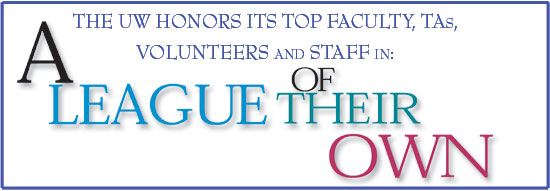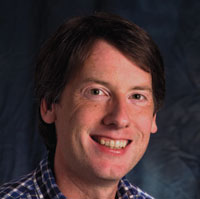

Distinguished Teaching Award
 Philip Reid
Philip Reid
Professor, Department of Chemistry
In the annals of university teaching greatness, the highest accolades often go to those who teach subjects in arts and letters. But science teachers have a harder row to hoe. Phil Reid is one of those unusual teachers who can make a difficult subject-chemistry in particular-memorable and fun. As one appreciative student puts it, Reid's talent is "creatively teaching material whose defining characteristic is a lack of room for creativity."
It's difficult to jazz up an introductory science course, Reid notes. But he finds chemistry and science "super interesting," and hopes his enthusiasm rubs off on students. Apparently, it does. Last year he received the department's teacher of the year award-not the first time Reid has been recognized as an effective teacher. He received several graduate teaching awards while doing doctoral work at Cal-Berkeley. Since joining the faculty at the UW, he has won a Career Award from the National Science Foundation and a Cottrell Scholar Fellowship from the Research Corporation. The two national awards recognize beginning faculty members who excel at both research and teaching.
Reid has a knack for explaining difficult concepts, which he does for students ranging from 450 freshmen in the introductory chemistry class to a handful of graduate seminar students. "One of Professor Reid's most impressive skills is his ability to clearly articulate even the most difficult concepts," writes a former honors student.
What he likes most is when his students challenge him. "Science continues to evolve and learn new things. And the way you learn new things is by questioning the old," he says. "I really love it when they challenge something I put forth in class. Those are the moments you look for, the ones that allow you to teach at a deeper level."
Reid has had an impact on his department. He has redesigned courses to bring them up to date with current teaching methods and been a leader in using the Internet to augment classes. He and other faculty members have revitalized a robotics colloquium, bringing national speakers to large campus audiences.
Remembering that he got hooked on research as an undergraduate at the University of Puget Sound, Reid invites promising undergraduates as well as graduates to join his research team. "That's one thing UW has to offer that a lot of other institutions don't," Reid says. "There's a richness of diversity in research going on here."
A graduate student who worked on Reid's research team writes, "Phil revealed to me the joys of science, while at the same time providing a candid analysis of good and bad scientific ethics and revealing the contrast between medium- and high-quality technical work. He helped me see truths about the politics of science and academics without souring my outlook."
Lessons learned in the lab are important, Reid says. "It's a whole different skill set: How do you define a problem? How do you design experiments that will tell you what you want to know? The struggle of research-it's not like you come in and flip three switches and boom, there's the answer. You have to wrestle this stuff to the ground. That's something you really don't see in the classroom."
Reid believes that the University offers students a message of possibilities. "I really respond at a deep level to the students coming here with hopes and expectations," he says. "You have a responsibility to meet those hopes and expectations with every skill you can bring to bear to help them along on that journey."-Beth Luce